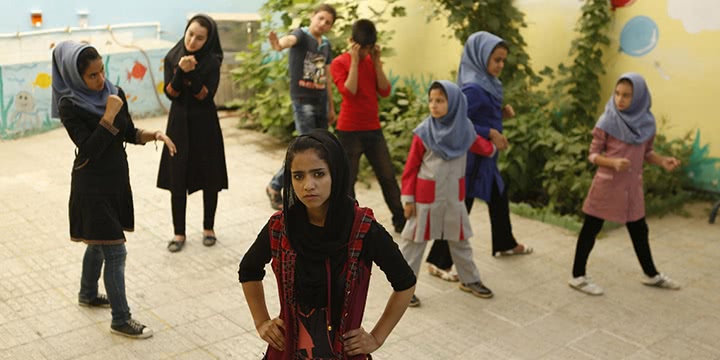The story of Afghani immigrant Sonita Alizadeh – rapper, activist and would-be child bride – is as compelling as they come.
Screening as part of Sydney Film Festival, Iranian director Rokhsareh Ghaemmaghami’s powerful documentary Sonita has collected prizes across the world, including the prestigious Grand Jury Prize and Audience Award at Sundance Film Festival. As well as capturing an inspirational tale of resilience, Sonita challenges the conventions of documentary filmmaking.
In the poor suburbs of Tehran, teenage Sonita – an undocumented exile – spends her time writing lyrics, dreaming of stardom, struggling to pay the rent and rebelling against the Afghan tradition of forced marriages. That is, until Ghaemmaghami crosses her path.
“My first idea was more focused on child labourers and stateless teenagers as well as discrimination against immigrants,” says Ghaemmaghami. “And then I met Sonita through my cousin who is a social worker at an organisation that supports street children. She called me and said she had a girl who writes lyrics and tries to record music but she doesn’t have any artistic connections.”
While Sonita’s passion for hip hop may seem like typical teenage defiance, the stakes are much higher in this case. Her future prospects become bleak when her mother arrives in Tehran with a plan to take her back to Afghanistan and marry her off to the tune of US$9,000.
“When I got to know Sonita, I began to realise how many problems she had,” says Ghaemmaghami. “At that point, I didn’t know much about the struggles Afghani immigrants have to face. I learnt how ambitious she was and started thinking that this would make a good documentary – someone who has so many dreams and so many obstacles.”
Ghaemmaghami admits now that she didn’t think this story would end happily. On the cusp of Sonita being whisked away, the film becomes unpredictable, mirroring the child’s precarious circumstances. Weighing up the ethics of intervening, Ghaemmaghami eventually decides to pay $2,000 in order to defer Sonita’s impending marriage.
“It was a heavy decision,” she says. “I was thinking, ‘I’m killing the drama – if I don’t interfere, we will still have a dramatic story. If I’m paying the money, there will be no problem anymore. Will I have an unfinished movie as a consequence of interfering?’ But imagining Sonita taken to Afghanistan and sold gave me a very bad feeling.”
As well as changing the course of Sonita’s life, Ghaemmaghami’s compassion changed her understanding of documentary filmmaking. “I have more courage now,” she says. “It’s not that I want to make documentaries in order to interfere in everybody’s lives. But I suppose I won’t respect the rules anymore. I’ll just be honest and clear and transparent.”
As the film traces Sonita’s seemingly insurmountable mission to prove her personhood, the difficulty of building support networks becomes apparent. “In countries where patriarchy is very strong, women’s solidarity is almost impossible,” says Ghaemmaghami. “Patriarchy dominates all of the relationships between women. Many women, like Sonita’s mum, support patriarchal values – that’s the problem.”
In spite of this, and with the indispensable assistance of Ghaemmaghami, Sonita ultimately manages to win enough support to alleviate her struggles. In some ways, she has since become an accidental activist – her rapping continues to channel her passion for social justice issues.
The Sydney screening will be followed by a Q&A with Ghaemmaghami and representatives from Human Rights Watch. When asked what she hopes people will glean from the film, Ghaemmaghami says that everyone should feel a personal responsibility.
“I was not a rich or powerful person, but I became able to change Sonita’s life,” she says. “$2,000 was not easy for me to afford, but it was not impossible. Most people are stronger, richer and more powerful than me. If everyone does what they can, we will make a better world.”
Sonita (dir. Rokhsareh Ghaemmaghami)shows at State Theatreon Sunday June 12, andEvent Cinemas George Street, Tuesday June 14, as part of Sydney Film Festival 2016.



































